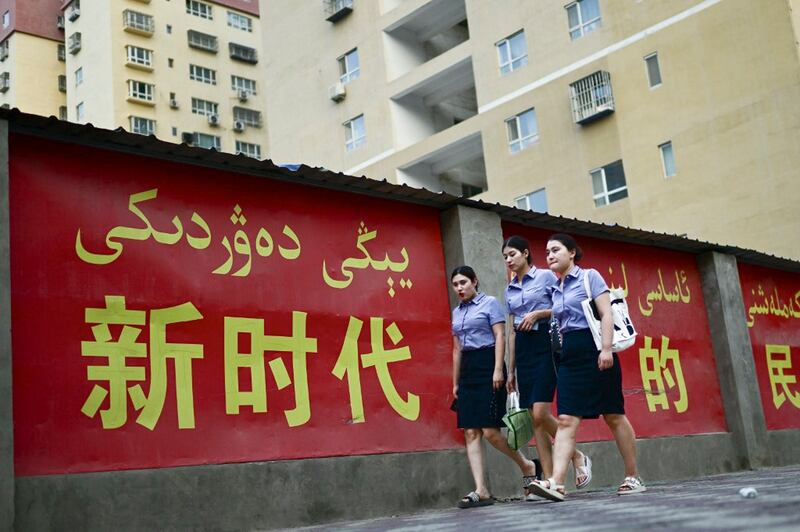A delegation of Palestinian and other Arab politicians praised China’s policies in Xinjiang during a visit to the northwestern region, sparking criticism from experts and Uyghur rights advocates for not highlighting the plight of fellow Muslims living in the region.
The delegation was led by Bassam Zakarneh, a member of Fatah's Revolutionary Council of Palestine and made up of politicians from Syria, Egypt, Lebanon, Iraq, Yemen, Jordan and Tunisia, according to a report by the Global Times .
On March 27, Xinjiang’s Communist Party chief Ma Xingrui welcomed them to Urumqi, the regional capital.
The goal of the visit, according to a Xinjiang Daily report, was to present a comprehensive understanding of the situation in Xinjiang and convey a narrative of a peaceful and vibrant region to the international community.
That’s in sharp contrast with the United States and some Western parliaments, which have accused China of carrying out a genocide against the 11-million-strong Uyghurs who live in Xinjiang – a region taken over by Chinese Communists in 1949 – by imprisoning, torturing and sterilizing those who do not fall into line.
Beijing has denied the claims and said that alleged concentration camps are in fact vocational training centers that have since been closed.
To the visiting delegates, Ma touted the region’s development, stability and guarantee of human rights for all ethnic groups, and accused the United States and the West of spreading lies, according to Chinese media reports.
“Their objective is to restrict and control China through Xinjiang,” Ma was quoted as saying.
‘See it for yourself’
During their meeting with Ma, the delegation praised China's creative governance measures and "unprecedented progress in economic development," the Xinjiang Daily said.
The delegation head said that “people of all ethnic groups live a good life, enjoy full freedom of religious belief, and have smiles on their faces,” according to the report, which didn’t provide the names of who spoke or any direct quotes.

The paper went on to say that the delegation said the United States and other Western nations are “smearing” China’s Xinjiang policy and fabricating rumors.
"Why not come and see it for yourself?" the delegates said, according to the Xinjiang Daily. "We will tell more people what we saw and heard in Xinjiang, China, so that Arab countries can better understand the real Xinjiang, China."
But experts on the region said China orchestrated what the delegates would and wouldn’t see during their visit so as to conceal the persecution of the Uyghurs.
The visitors should have been allowed to speak directly and freely with Uyghur Muslims living in the region, said Robert McCaw, director of the Government Affairs Department at the Council on American-Islamic Relations.
“Apparently, China wants to reach out to these leftist movements in the Arab world, and China wants to use them as its own propaganda,” said Mustafa Akyol, senior fellow at the Cato’s Institute’s Center for Global Liberty and Prosperity. “The Arab world should not be influenced by China.”
Political dynamics at play
China has used such visits to Xinjiang to win over other Muslim groups – and push them away from the United States and other Western powers, experts say. It has also supported the Palestinians, as it seeks to expand its influence in the Middle East.
Ten 10 months ago, Palestinian President Mahmoud Abbas told Chinese President Xi Jinping during a visit to Beijing that he believed the Xinjiang issue, often framed as a human rights concern, was in fact a battle against terrorism, extremism and separatism.
And last August, China invited delegates from the 57-nation Organisation of Islamic Cooperation to visit Xinjiang, in a bid to promote its rosy narrative about the peace and prosperity enjoyed by Uyghurs and blunt international criticism.
“China seeks to build consensus and strengthen its global influence,” said Ma Ju, an ethnic Muslim Hui scholar based in the United States.
Meanwhile, Muslim nations may be unwilling to criticize China because they need its political support and investment, experts said.
Although some Muslim countries have endured a painful history under Western colonialism, they may be willing to overlook that China has effectively colonized the Uyghur homeland, Ma said.
“For them, the primary concern seems to be finding a method to counter the influence of the U.S. and the West,” he said.
Translated by RFA Uyghur. Edited by Roseanne Gerin and Malcolm Foster.
